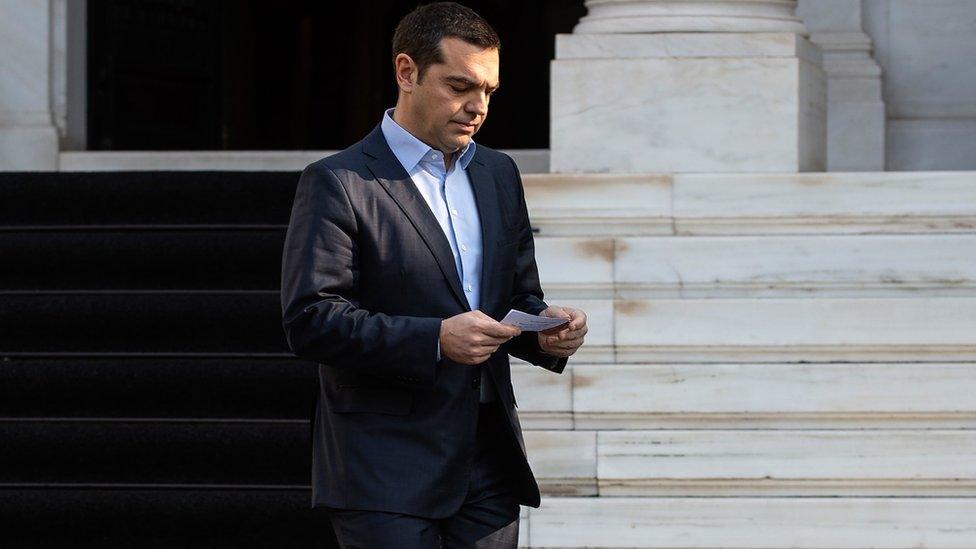Greek government crisis over Macedonia name change
- Published

Mr Tsipras may be counting on a split within the junior coalition party
Greek Prime Minister Alexis Tsipras has said he will call a confidence vote after his governing coalition split over the Macedonia name change.
Defence Minister Panos Kammenos withdrew his party's support, signalling his opposition ahead of an expected vote in the Greek parliament.
The two countries recently agreed that Greece's northern neighbour would be called North Macedonia, therefore ending a 27-year-long row.
Macedonia has ratified the deal.
Greek nationalists argue that the name "Macedonia" can only refer to the Greek province of the same name.
The dispute, which has raged since it voted for independence from Yugoslavia in 1991, is blocking Macedonia's hopes of joining Nato and the European Union.
Where does this leave Greece?
Following the resignation of Mr Kammenos, Mr Tsipras said he was moving immediately to a confidence vote, which is expected on Wednesday, external, according to Greek newspaper Kathimerini.

Panos Kammenos (centre) has called the deal a sell-out
The Syriza party of Mr Tsipras has 145 seats in the 300-seat parliament and Mr Kammenos has called on his Independent Greeks (Anel) party, which has seven, to vote against the government.
If the government loses, the next general election, due to be held in the autumn, could be brought forward.
The main conservative opposition party, New Democracy, also opposes the new name but there is speculation that some Anel MPs, as well as some independents, may support the government in the confidence vote.
Analysts say Mr Tsipras will continue with his attempt to have the new name for Macedonia ratified.
Allow X content?
This article contains content provided by X. We ask for your permission before anything is loaded, as they may be using cookies and other technologies. You may want to read X’s cookie policy, external and privacy policy, external before accepting. To view this content choose ‘accept and continue’.

Allow X content?
This article contains content provided by X. We ask for your permission before anything is loaded, as they may be using cookies and other technologies. You may want to read X’s cookie policy, external and privacy policy, external before accepting. To view this content choose ‘accept and continue’.

Syriza, a party of the radical left which came to power on an anti-austerity platform in January 2015, was forced to accept hard economic reforms as a condition of emergency loans aimed at rescuing the country's debt-ridden economy.
Greece successfully completed a three-year eurozone emergency loan programme worth €61.9bn (£55bn; $70.8bn) in August but deeply unpopular cuts to public spending are set to continue.
Announcing his resignation from the cabinet, Mr Kammenos said, "This government has completed its purpose," referring to the economic crisis.
What's the source of the dispute?
The name Macedonia already belongs to a northern region of Greece. By adopting the name in 1991, the new nation infuriated many Greeks, who suspected their northern neighbour of territorial ambitions.
Greece's objections forced the United Nations to refer to Macedonia as "the former Yugoslav Republic of Macedonia".
Athens also vetoed Macedonia's attempt to join Nato in 2008 - and blocked its EU membership ambitions.
Since 1991, many suggestions have been proposed, then rejected.
But a change of government in Macedonia in 2017 finally led to the deal reached last year.
Under the proposed agreement, the country's language will be called Macedonian and its people known as Macedonians (citizens of the Republic of North Macedonia).
The new name will be used both internationally and bilaterally, so that even the 140 or more countries that recognise the name Macedonia will also have to adopt North Macedonia. In Macedonian, the name is Severna Makedonija.